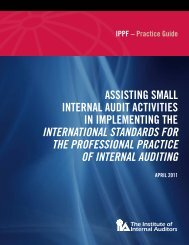2011 State of the Internal Audit Profession Study - PwC
2011 State of the Internal Audit Profession Study - PwC
2011 State of the Internal Audit Profession Study - PwC
Create successful ePaper yourself
Turn your PDF publications into a flip-book with our unique Google optimized e-Paper software.
How does internal audit overcome<br />
this challenge? Are <strong>the</strong>re a sufficient<br />
number <strong>of</strong> people who possess<br />
this diverse set <strong>of</strong> capabilities? Can<br />
you train and develop it? The CAEs<br />
interviewed use a number <strong>of</strong> varied<br />
approaches to solving this issue:<br />
• Delivering training programs that<br />
balance technical and pr<strong>of</strong>essional<br />
development courses, with an<br />
increasing emphasis on interpersonal<br />
and leadership skills, including<br />
communication and presentation<br />
skills; coaching and people development<br />
capabilities; management and<br />
leadership approaches; negotiation<br />
skills; and specific industry training.<br />
• Sourcing specialized expertise from<br />
external service providers, ei<strong>the</strong>r<br />
on a recurring basis or in a transitional<br />
mode. Even larger organizations<br />
that seek to build a particular<br />
skill may team with a third party to<br />
deliver audits jointly and provide<br />
on-<strong>the</strong>-job training in <strong>the</strong> process.<br />
• Recruiting leaders from <strong>the</strong> business<br />
into internal audit, ei<strong>the</strong>r on a<br />
permanent or “guest” basis.<br />
• Establishing hiring strategies<br />
that shift focus away from solely<br />
accounting and technical backgrounds<br />
to those with a more wellrounded<br />
business experience. As<br />
audit plans broaden in scope, some<br />
are looking to nontraditional backgrounds<br />
such as engineering and<br />
manufacturing.<br />
Although <strong>the</strong>se times demand creative<br />
approaches to skill development and<br />
talent management, leading organizations<br />
have found that <strong>the</strong> most effective<br />
and lasting training and personal<br />
development occurs on <strong>the</strong> job. As one<br />
CAE put it, “being an internal auditor<br />
is like getting a paid MBA.” But <strong>the</strong><br />
internal audit MBA does not come from<br />
sitting in a classroom; ra<strong>the</strong>r it is only<br />
achieved by those who get out into<br />
<strong>the</strong> business, forge relationships with<br />
leaders across <strong>the</strong> organization, and<br />
develop a thorough understanding <strong>of</strong><br />
<strong>the</strong> strategy, risks, and operating model<br />
<strong>of</strong> <strong>the</strong> company.<br />
For that reason, many <strong>of</strong> <strong>the</strong> CAEs<br />
interviewed have implemented formal<br />
relationship management programs<br />
for <strong>the</strong>ir teams, from <strong>the</strong> newest staff<br />
members to <strong>the</strong> most experienced<br />
directors. For some, relationship<br />
building has been built into <strong>the</strong>ir staff’s<br />
performance expectations and personal<br />
development plans. Through this form<br />
<strong>of</strong> on-<strong>the</strong>-job training, internal auditors<br />
can develop <strong>the</strong> business acumen,<br />
strategic thinking, interpersonal<br />
communication, and leadership skills<br />
that are vital to delivering value and<br />
staying relevant.<br />
20 Lights, camera, action… Scripting internal audit for a changed world


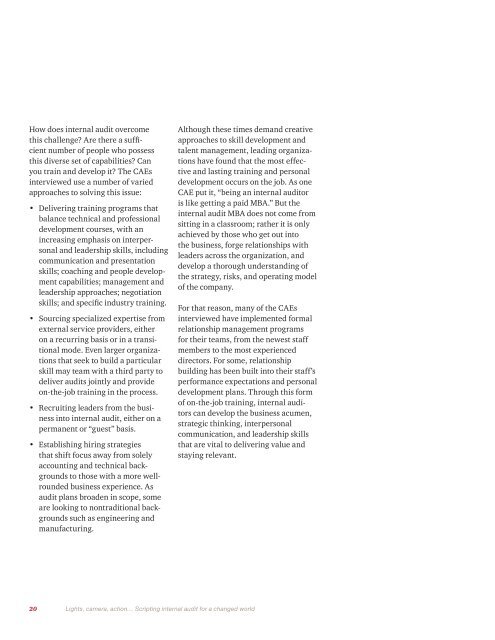
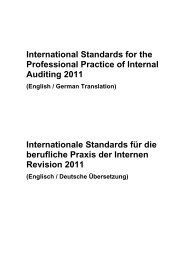
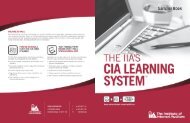
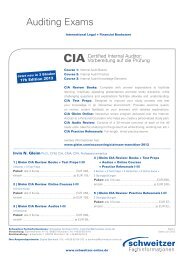
![Ausgabe 02_2011 [PDF, 3.4 MB] - Institut für Interne Revision ...](https://img.yumpu.com/37945857/1/184x260/ausgabe-02-2011-pdf-34-mb-institut-fa-1-4-r-interne-revision-.jpg?quality=85)
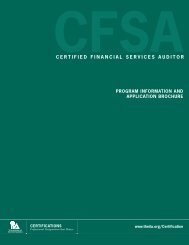
![Ausgabe 2004.2 [PDF, 1.1 MB] - Institut für Interne Revision Ãsterreich](https://img.yumpu.com/37941871/1/184x260/ausgabe-20042-pdf-11-mb-institut-fa-1-4-r-interne-revision-asterreich.jpg?quality=85)
![Ausgabe 02_2009 [PDF, 1.2 MB] - Institut für Interne Revision ...](https://img.yumpu.com/37941824/1/184x260/ausgabe-02-2009-pdf-12-mb-institut-fa-1-4-r-interne-revision-.jpg?quality=85)
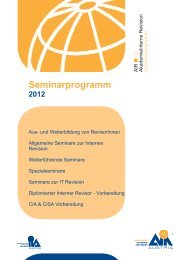
![Ausgabe 03_2011 [PDF, 9.1 MB] - Institut für Interne Revision ...](https://img.yumpu.com/37941423/1/184x260/ausgabe-03-2011-pdf-91-mb-institut-fa-1-4-r-interne-revision-.jpg?quality=85)
![Ausgabe 2006.2 [PDF, 852.7 KB] - Institut für Interne Revision ...](https://img.yumpu.com/37941416/1/184x260/ausgabe-20062-pdf-8527-kb-institut-fa-1-4-r-interne-revision-.jpg?quality=85)
![Ausgabe 03_2007 [PDF, 1.5 MB] - Institut für Interne Revision ...](https://img.yumpu.com/37941405/1/184x260/ausgabe-03-2007-pdf-15-mb-institut-fa-1-4-r-interne-revision-.jpg?quality=85)
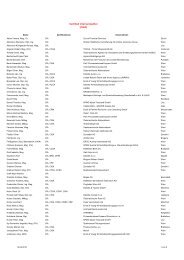
![CEE Konferenzprogramm [PDF, 11.8 MB] - Institut für Interne ...](https://img.yumpu.com/37941387/1/184x260/cee-konferenzprogramm-pdf-118-mb-institut-fa-1-4-r-interne-.jpg?quality=85)
